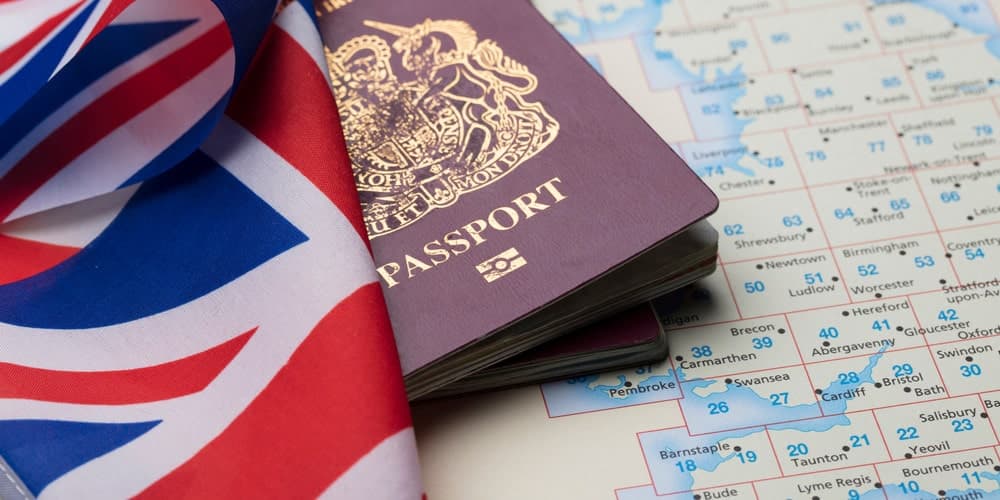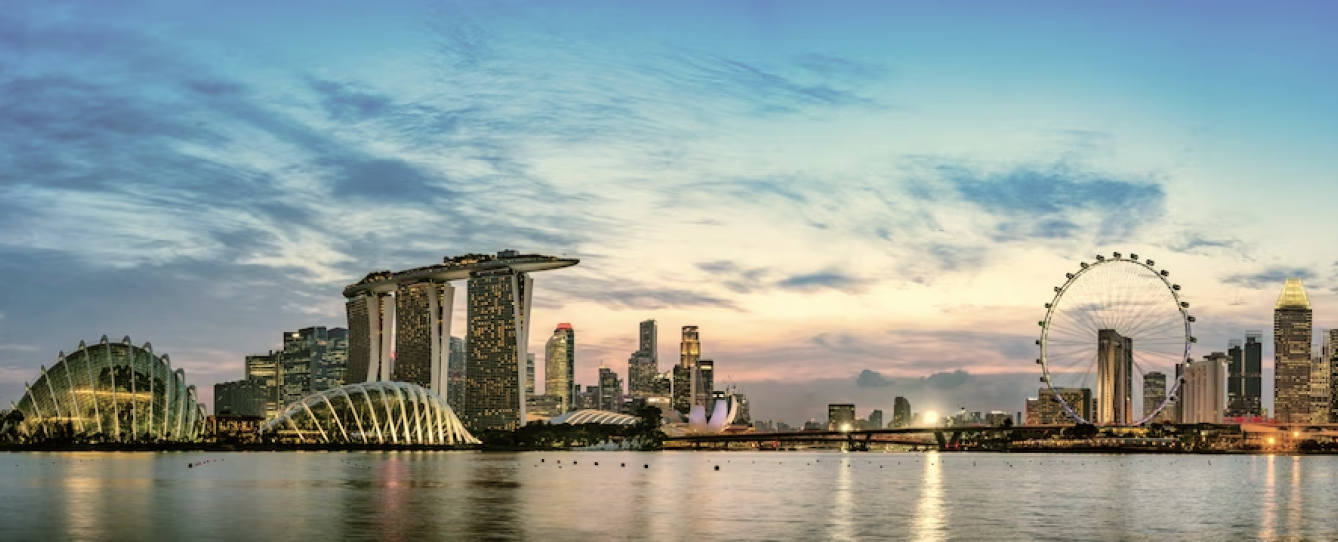The United Kingdom is one of the finest places to live, work, and do business, located in Northwestern Europe. Many Indians wish to be British citizens. Living in a stable, thriving, and internationally interconnected country is like a dream come true. In this blog, we will discuss the eligibility criteria, required documents, different routes, type of visa available for Indians, step-by-step process, common grounds for refusal and the advantages of being a UK Citizen. Let’s start with the benefits:
Benefits Of UK Citizenship for Indians

Getting British citizenship represents a major step for an Indian national: it brings in many privileges and amenities. These advantages encompass a wide range of aspects, including:
1. Travel Freedom: Undoubtedly, one of the main benefits of being a UK citizen is having travel freedom. Being a UK citizen means you can easily move around various countries without obtaining travel documents or going through difficult visa application processes. It creates a wide range of opportunities for business and leisure travellers. If you intend to have a vacation, job hunting or any other business in the world, UK citizenship will be vital as it will greatly facilitate journey activities.
2. Work Opportunities: UK citizens have unlimited access to the UK job market. It also expands prospects for getting better job offers and growth in one’s career development.
Indians can freely work in the UK because of British citizenship granted. Therefore, you will not require a visa or permit to take up any job, whether it is industrial or commercial. In this way, it streamlines the search for a job and opens up many career paths in one place. Whether you’re looking to advance in your current profession or explore new career paths, UK citizenship offers you the freedom to choose and grow professionally.
3. Education: The UK provides even more convenient accessibility to world-class international education. Scholarships may become more available for UK nationals enrolling in educational institutions.
Among notable benefits of UK citizenship lies access to globally recognised educational institutions within the United Kingdom. If you are a British Citizen, you get exposure to elite universities that enjoy worldwide status. In addition, this may appeal to Indian students wishing to expand their knowledge to acquire credible academic credentials that could propel them forward in their careers.
4. Social Benefits: The British people enjoy different social support programmes, including health care, unemployment benefits, and pensions.
Holding a European passport carries a plethora of social benefits which positively impact your life as a whole. Some of these benefits provide coverage for the NHS, which guarantees complete medical care, besides financial relief in instances of unemployment or retirement. They are formed to give a security net and make it possible for you, together with your family, to obtain essential services as well as financial assistance at critical times.
5. Political Participation: British-born citizens are able to participate in general elections, which influence decision-making in Great Britain.
The UK people are allowed to take part in the democratic government of their country. You can cast your vote in general polls and participate in choosing people who will govern you. You can take active steps towards guiding the policy and direction of the UK yourself. Involvement in the political process means having a say in those decisions that impact your life and the nation’s future.
Eligibility for UK Citizenship
To embark on the journey to UK citizenship, Indian citizens must meet specific eligibility criteria:
1. Residency: Indians are subjected to ILR before acquiring permanent residency in the UK.
2. Legal Status: Applicants need to have remained lawfully resident in the UK during the qualifying period.
3. Good Character: To be eligible for citizenship, one must have a clear criminal record and be law-abiding.
4. Language and Knowledge: To be eligible, the applicant must have a good knowledge of English and pass the Life in the UK test.
5. Financial Stability: The applicant needs to show they can sustain their stay and finance themselves before being allowed in any state or country.
Documents Required For Acquiring UK Citizenship

Generally, these are the documents you should have to acquire UK Citizenship:
1. Certified Copies of Birth Certificate with Apostille.
2. If you have a marriage certification in another language other than English.
3. Birth certificate for children: original copy – Apostilled, if applicable.
4. Marriage Certificate for husband/wife (if applicable)
5. Any divorce decrees, death certificates where applicable
6. Any Maintenance and Child Support – any existing court orders.
7. Your passport must have a valid visa/entry stamp not more than 9 months from the date of application.
8. Two photos and certified copies with Apostille, if available.
9. Utility bills for proof of address.
10. Employment documents such as ERCs and P60s.
Pathways To UK Citizenship for Indians
Indians have a variety of options when it comes to UK citizenship. Every pathway offers different demands and benefits to people. Here are the primary routes:
1. Indefinite Leave to Remain (ILR): Indians can enjoy ILR and work in the UK as non-immigrants. Being an integral step to citizenship.
2. Naturalization: Individuals with an ILR have the opportunity to become British citizens by applying for naturalisation once they meet a residential eligibility requirement.
3. British Ancestry: Anyone whose grandparent was born in Britain can apply for a British Ancestry visa and thereby become a citizen of that country.
4. Investment-Based Citizenship: Innovator visa allow citizenship when a specific amount is invested and the investor has to obtain resident status for a given period of time.
Types of UK Visas for Indian Nationals

Indians who want to work in the UK have various visa choices. It’s important to note that a visa is mandatory for entry into the UK. Here are concise descriptions of various visa types:
Tier 1 Visa (General)
Tier 1 is a point-based visa that relies on the applicant’s characteristics such as age, educational background, past salary, and business investment made in Britain.
These additional points are added on the basis of English language proficiency, work experience, etc. Indeed, teachers do not qualify for this Point-based System.
Tier 2 Visa (General)
This category has two segments: Skilled and Intra-company transfers. The qualification points are calculated in categories according to qualifications, while the others with limited allocation are only governed by the UK authorities. Tier 2 falls in place for some professionals like doctors and teachers in India due to restricted availability.
Tier 2 Visa (Intra-company transfers)
This visa is open to Indian employees working for multinationals located in India, provided that their employer has been granted a Home Office certification. This visa is meant for people of Indian origin who cannot get the Tier 1 General Category Visa but desire to stay in the UK.
Tier 5 Visa (Young People)
This Visa is applicable for individuals from outside the European Union between the ages of 18 and 30, creating employment opportunities for young people in the UK.
The applicant must have been away from the EU for at least three months before making an application. This time frame can be reduced to only one month upon presenting evidence of a job offer or a certificate of sponsorship.
Tier 6 Visa (Youth Mobility Scheme)
This visa is exclusively applicable to the citizens of India who are below thirty years old at the time of their British citizenship application.
Tier 4 (General) Visa
There are some Indian citizens who are employed within Britain but want temporary residence there. The holder is granted a two-year stay and can re-enter the country after another two years on this visa. This visa does not allow holders to settle permanently or be granted permanent residence in addition to allowing entry into the UK. In addition, the holder needs to produce evidence of sponsorship from an employer.
HSMP Visa
The British citizen’s spouse or civil partner can get this visa. It is ILR- a permanent residence visa of one year. Nonetheless, anyone wishing to work in the UK is required to seek a work permit. The applicant should possess good character and have resided in Britain for more than one year before applying for this Visa.
Ancestry Visa
This visa is only eligible for Indians who have parents who are citizens of Fiji, Pakistan, and Bangladesh and have been UK residents for four years. However, this rule affects those Indian nationals who arrived in Britain after 1971, and they are not regarded as ex-colonial subjects as they were before.
UK Settlement
After living in Britain as a spouse for five years or as a permanent resident for eight years, one can apply for Briain Settlement.
Process To Acquire UK Citizenship
The journey to UK citizenship involves several steps, each requiring careful attention and documentation:
1. Eligibility Assessment: Eligibility is determined by residency, immigration status, character, English language skills, and financial soundness.
2. Apply for ILR: Apply for Indefinite Leave to Remain (ILR) if not an ILR holder.
3. Residence Period: Hold ILR and meet the required residence period.
4. Language and Knowledge Tests: You need to pass the English language & the Life in the UK tests.
5. Application Submission: You are required to complete and send the citizenship application together with the relevant supporting documents.
6. Waiting Period: You need to wait for a response, which may take months.
7. Citizenship Interview (if applicable): In some instances, you may need to attend an interview.
8. Citizenship Ceremony: Take an oath of allegiance at the time you are given the approval for attending a citizenship ceremony.
9. Receiving the Certificate of British Citizenship: After the ceremony, you shall receive the Certificate of British Citizenship as a confirmation that you have become a British citizen.
Top Reasons for Denial of Citizenship UK

Once you have learnt how to acquire UK citizenship for Indian students and others, there is a list of mistakes one should never make, or their applications could be rejected. Citizenship applications are generally rejected due to the reasons stated below.
1. Character and Conduct
Experts in immigration will look into the applicant’s background and determine if they had good moral behaviour while living in the UK. In most cases, criminal records arise out of such cases of bail jumping. Therefore, applicants must behave properly and adhere to British law in order not to face charges.
2. Insufficient knowledge
The failure of the Life in the UK test will be due to the failure of questions concerning the UK, our culture, and their details. Ultimately, this may result in the failure of your citizenship application. Thus, one must learn about the country prior to acquiring citizenship there.
3. Fraud and delay in responses
Submitting false documents or attempting to forge details within the letter of application will be a dismissal offence. However, if you fail to reply to head office inquiries promptly, this will negatively harm the standing of your application.
Reflecting On the Journey To UK Citizenship
Getting UK citizenship while being an Indian citizen is very transformational. It opens up many opportunities and privileges. This complex process should be meticulously planned and adhered to strict criteria and demanding documentation. By understanding the pathways, types of visas, and steps in the process, Indians will be able to make their way through the process successfully. The challenges encountered are minute when weighed against the many benefits that come with being a UK citizen, ultimately promoting a better tomorrow in a multiethnic society. Whether it’s about stepping out into something new, pursuing an ambition, or making things better for your kids, UK citizenship is a way to open up many great possibilities and moments for you. Passport Legacy is here to facilitate UK Citizenship programs.
Read More:
- 10 World’s Most Powerful Passports
- How Strong Is The Dominican Passport?
- How Strong Is The Antigua And Barbuda Passport?
- Benefits Of Having A Second Passport
- How Strong Is The St Lucia Passport?
- How Strong Is The St Kitts And Nevis Passport?
- Portugal D7 Visa 2023: What Are The Income Requirements And Visa Application Process?
- The 10 Easiest Countries To Immigrate As An Expat
- How To Become An American Citizen From Australia?
- Start Up Visa Canada: Why Is Canada A Good Option To Invest In?
- Interesting Facts About Dual Citizenship
- 5 Richest People In Portugal
- 5 Best Golden Visa Programs
- Benefits Of Having A US Citizenship
- The 10 Richest People In The UK
- EU Citizenship By Investment
- Turkish Passport – Benefits, Guide And Procedure
- US Citizenship For Nigerians – How To Apply
- The 10 Easiest Countries To Immigrate As An Expat
- 5 Best Golden Visa Programs
- Global Citizenship – A Path To A Borderless World
- Vanuatu Passport: Benefits, Guide And Ranking
- Start Up Visa Canada: Why Is Canada A Good Option To Invest In?
- How Can I Get US Citizenship From Germany
- EU Citizenship For Kenyan Citizens
- How to Become a US Citizen from UK
- Portugal Golden Visa – The Ultimate Guide (2024 Update)




























